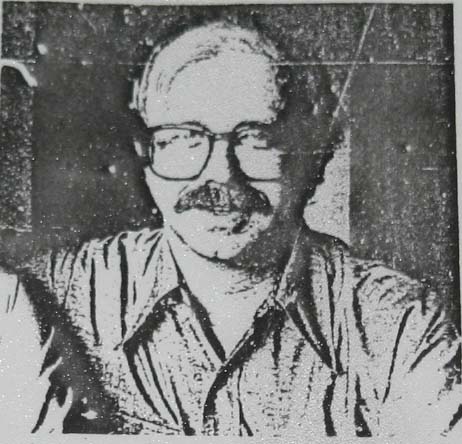
| By Admin1 (admin) (pool-141-157-42-145.balt.east.verizon.net - 141.157.42.145) on Tuesday, February 17, 2004 - 8:41 pm: Edit Post |
Remember with Honor

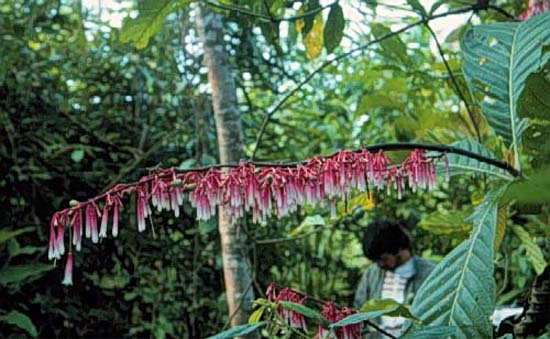
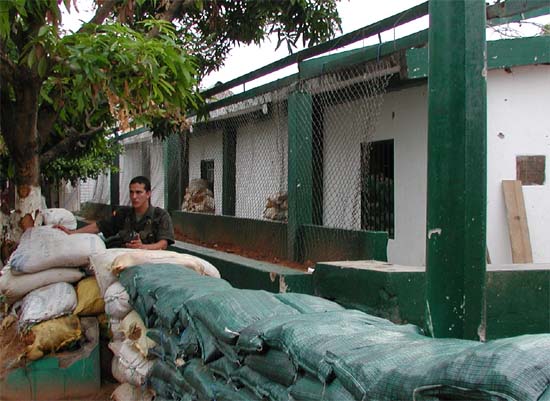
"On Monday, February 14, Richard Starr, a Peace Corps Volunteer in Colombia, was kidnapped by a guerrilla group during an attack on a local police outpost. A Task Force has been assembled at the State Department to monitor and report developments as they occur. Doris Brinkman, OSS/LA Officer, has been named to serve as the Peace Corps liaison with this Task force. Among her responsibilities is maintaining communication with the PCV/s family."The Activity Report for the following week; February 22-25, 1977 reported little change in the situation:
[Executive Correspondence-Dellenback Record Group 490 FRC National Archives, College Park, MD]
"No further word has been received from the group that kidnapped Colombian PCV Richard Starr. Doris Brinkman continues to represent Peace Corps with the State Department Task Force handling this situation and maintains constant contact with the PCV's family."A xerox copy of the newspaper of the National Caucus of Labor Committees and the U.S. Labor Party in its February 25, 1977 issue gave a more detailed account of the raid and also documents one immediate concern of Peace Corps/Washington: the unfounded allegation that Starr was linked to the CIA. The newspaper reported the following:
[Executive Correspondence - Dellenback; Record Group 490 FRC National Archives, College Park, MD]
"...The FARC seizure of a small rural town in the department of Meta Feb. 14 captured headlines in every newspaper in Colombia. According to the liberal Bogota daily El Tiempo, as many as 75 guerrillas marched into the town of La Macarena and laid seige to the local police station. After capturing the newly appointed police chief, the guerrillas seized agarian credit office funds, radio equipment, food and medicines, painted the towns with slogans and departed, taking with them one Richard Starr, a North American they found in the local judge's chambers.Peace Corps wasted no time in dealing with the allegation regarding the CIA.. In a March 4, 1977 Memorandum to Action Director Sam Brown, Fred Hansen wrote:
The Latin American press reported that Starr is a CIA agent and a Fellow of the CIA-linked Summer Linguistics Institute (ILV). Officially, he is a member of the Peace Corps.
El Tiempo reports that the military commander of the region gave a press conference following the incident to register his "disillusionment" with the population which refused totally to come to the defense of the police station "which had been placed there to protect them." The La Macarena police chief, when asked about the citizens' reaction, admitted that, "No one came out, except for the priest 'who called through a loud speaker for the people to come help the police."
[Xeroxed copy; Executive Correspondence-Dellenback-Record Group 490 FRC National Archives-College Park, MD]
"The Summer Linguistic Institute is a group which works in Latin American and is primarily a religious organization. It has worked with various native Indians throughout Latin America in translating the Bible into the local Indian dialects and then to proselytize about God in this process of teaching them. Peace Corps has no knowledge of the group every having been linked with the CIA.What is apparent from a search of the executive correspondence was that the overwhelming concern was to protect the life of Starr by acting judicially within the very complex political situation. State Department documents indicate that, at the highest level, concern over the life of Starr was expressed and reassurance sought that that concern would be appropriately transmitted in- country. [Telegram - 0 291409Z MAR 77 Executive Correspondence 1977 - Dellenback, Record Group 490 FRC National Archives, College Park, MD].
To the best of our knowledge Peace Corps has not worked with the Summer Linguistic Group in Colombia. Peace Corps has, however, worked with the group in Ecuador under the auspices of the Ecuadorian Ministry of Education. Peace Corps pulled out of these joint programs as soon as it became clear that the real purpose of the Institute was to proselytize and not to teach.
I would suggest that you contact the editor of "New Solidarity" and seek an immediate retraction of the reference to the CIA link to the Peace Corps…"
[Executive Correspondence 1977 -Dellenback Record Group 490 National Archives, College Park, MD]
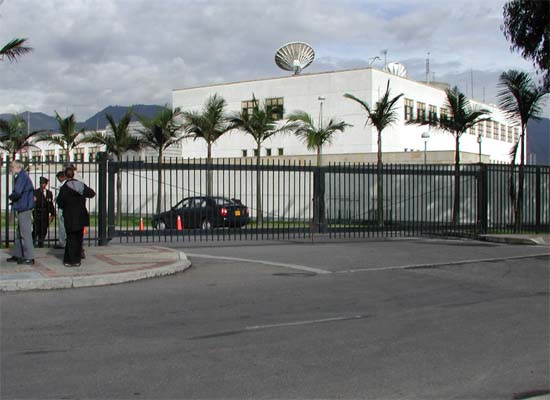
"Mrs. Charlotte Jensen, Mother of PCV Richard Starr, was in Washington on three occasions accompanied by Special Services Officer Doris Brinkman. Visits included the American Red Cross to request they deliver a knapsack prepared by Mrs. Jensen to the Colombian counterpart in Bogota. The ARC is requesting the Colombia Red Cross to cooperate; Mrs. Jensen met with the Colombian Charge D'Affaires to make a personal appeal; and visits were made to Sen. Jackson, Sen. Magnuson and Rep. Meeds of the State of Washington."In August, Mrs. Jensen traveled to Colombia at her own expense and this lengthy Department of State telegram, (Bogata 7588) attached to an ACTION Memorandum to Sam Brown, Gretchen Handwerger, From Mary E. King (newly appointed Country Director for Peace Corps) dated August 22, 1977, describes that visit:
[Executive Correspondence 1977 - Dellenback, Record Group 490 FRC National Archives, College Park, MD]
"Thursday, August 11: Mrs Jensen and PCD drove to Villavicencio to meet with the Commander of the VII Army Brigade in Charge of La Macarena region. The opinion of the General in Charge is that Starr is still alive. He gave very similar reasons to the ones given by DAS the previous day. (Bogota 7422). Essentially the Gereral argued that FARC has a strong interest in keeping Starr alive and probably he is being used in some capacity (I.E. medic or cook). The General dispelled Mrs. Jensen's fear that Richard may have been killed in a FARC/Army encounter by assuring her that there has been no such encounter since the kidnapping.Leupen, a Canadian living in Colombia and Honorary Counsel for Holland, had himself been kidnapped near Cali by thirteen FARC guerillas in February 1975. Ransom was demanded and after 20 months Leupen was released. Leupen reassured Starr's mother on the following points:
Mrs. Jensen left the meeting much relieved by the reassurances given to her by the general and his staff. This meeting marked a turning point in Mrs. Jensen's emotional state. For the first time PCD detected in her a change from deep pessimism to a growing belief that her son could still be alive.
Friday, August 12: Mrs. Jensen and PCD met in Bogota with Eric Leupen for close to two hours. This has been so far the most fruitful of Mrs. Jensen's meeting in that it did much to strengthen her developing optimism."
"Delay in Contact: In Leupen's view six months without contact was not unusual. In his case FARC did not contact his wife for four months and after the first attempt to pay-off had failed there was no further contact for several months. He told Mrs. Jensen that FARC is in no hurry and has unlimited patience. He advised her to equally patient.Mrs. Jensen left the meeting with a new sense of hope. Similarly King was now more optimistic about Starr's survival than he had been before and wrote in a report:
Torture: Leupen assured Mrs. Jensen that FARC would not torture her son. They are very disciplined and even when Leupen twice attempted escape they took no reprisals.
Forced Marches: Leupen told Mrs. Jensen not to worry about her son being unable physically to keep up with the guerillas according to Leupen he stayed in the same place throughout his captivity.
Clothes: Leupen told Mrs. Jensen that FARC had provided him with warm clothes and had built for him a bed with a plastic sheet to protect him from the rain. He was never cold nor did he get wet.
Ransom: FARC originally asked for a million dollars from the Dutch government, the release of three political prisoners by the Colombian government and a smaller sum of money from his family. They eventually settled for two million pesons (160,000) which was paid by Leupen's family. Leupen, therefore, told Mrs. Jensen not to despair when presented with the first seemingly impossible ransom demands."
"PCD believes that Mrs. Jensen's visit to Colombia has been worthwhile. It has dispelled most of her worst fears and given her new hope. It has acquainted her with local conditions enabling her to make more realistic judgments. It has given PCD the opportunity to develop a personal relationship with her. And, it may well prompt some contact from FARC."
[Executive Correspondence--Record Group 490 FRC National Archives-College Park, MD]
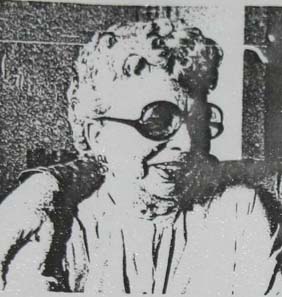
"For three years, his captors forced him from jungle camp to jungle camp, feeding him rice, corn, bananas and wild pig and monkey meat. He lost weight and contracted parasites. Once he heard a radio report that he was dead."Mrs. Jensen evidently did have a letter from her son and was able to send him the medicine, books, clothes radio batteries, pen and paper he had requested.
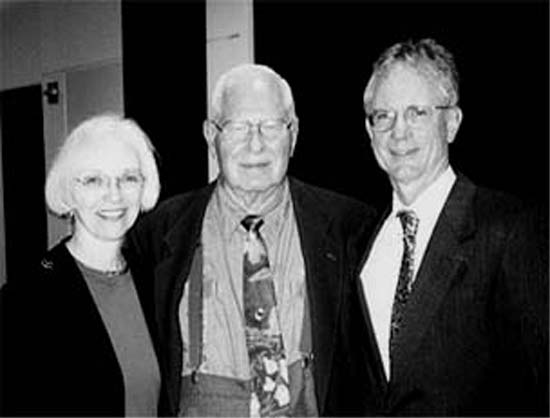
"At the end of her rope, Mrs. Jensen appealed to me for help, explaining that she was afrraid her son was sick or dying in the Andean jungles.The negotiations were successful and on February 12, 1980, Richard Starr was released in Neiva, Tolima, Colombia. He had been held captive 1093 days.
I published a plea to the terrorists, asking them to contact me for private negotiations that would bring Starr's release. After months of haggling, the guerrillas suddenly demanded $250,000 ransom. I borrowed the money from a friend in the business community, and my associate Jack Mitchell flew to Colombia for a rendezvous with the kidnappers."
"Richard Starr, an American held hostage three years in a South American jungle, said the psychodrama was over-played. 'I don't even dream about it," Starr said..." (Washington Post, January 20, 1981).
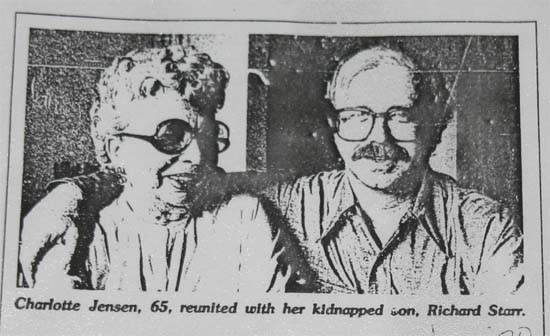
"What is known is that Starr was serious and soft-spoken and led a quiet life. he loved classical music, books and tropical plants and was devoted to a creed of personal and political freedom. Since his release from captivity three years ago, he enjoyed his work in the forests and fields of the Olympic Mountains as a botanist for the National Park Service."The AP went on to quote Joe Hess, a U. S. Fish and Game warden, that:
"The captivity left him preoccupied with the notion of freedom."
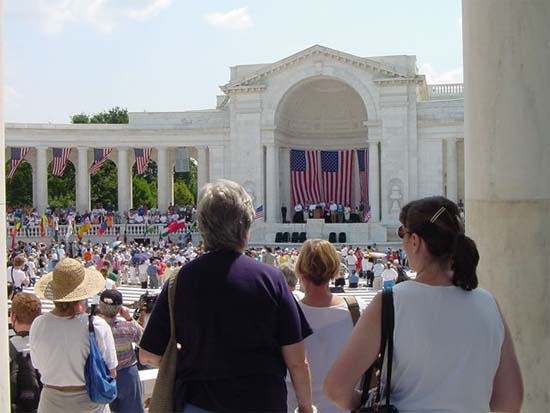
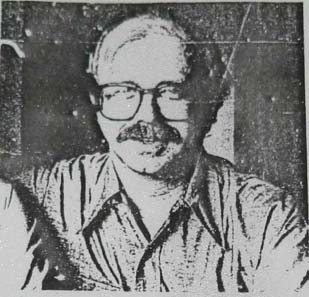
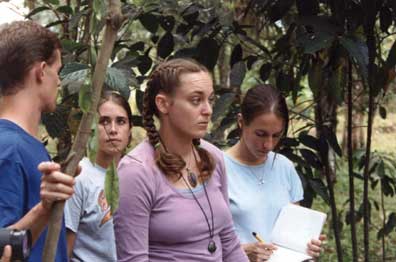

| By Harol G. Lierly (dpc6682009031.direcpc.com - 66.82.9.31) on Wednesday, February 18, 2004 - 9:00 am: Edit Post |
Perhaps it is time to have a wall of honor,at Peace Corps Hqts, or someother place, to honor Volunteers who give their lives in service of their country. As world tensions grow, the dangers to Volunteers will grow.
Harold "Tex" Lierly
Peace Corps Thailand
1963-1967
| By Anastasia Hopkinson, UpperVolta1, Burkina Faso 1967-1969 (pcp07219752pcs.anapol01.md.comcast.net - 68.49.50.232) on Wednesday, February 18, 2004 - 1:38 pm: Edit Post |
Life anywhere on the planet carries risks of disease, disability and death. But when one is voluntarily serving under the authority and responsibility of the United States government, then special acknowledgement should be made for those whose sacrifice is tragically death.
I agree with Tex Lierly's posting above. A place of honor is needed to acknowledge Peace Corps volunteers who died in service or as a result of service.
| By Ron Seibel (cache-da08.proxy.aol.com - 205.188.208.12) on Wednesday, February 18, 2004 - 2:04 pm: Edit Post |
The CIA, FBI and all Military branches have a "Wall of Honor." So should Peace Corps.
| By Kathy Callahan (dialup-67.74.96.191.dial1.philadelphia1.level3.net - 67.74.96.191) on Wednesday, February 18, 2004 - 3:12 pm: Edit Post |
Peace Corps Headquarters does have a wall of honor--it is in the lobby and is visible immediately upon entering the building. It lists all of those PCVs who died in service.
| By Carol Ann Lysek (dialup-ras27-168.eug.or.uspops.net - 64.28.63.168) on Wednesday, February 18, 2004 - 3:27 pm: Edit Post |
There should be some kind of recognition given to volunteers who gave their life while a PCV. I'll always remember a guy who had just arrived in country as I was about to leave. He got caught in a rip tide in the South China Sea and drowned swimming in an area that I had swum in uneventfully for a year and a half!
Carol Ann Lysek
RPCV Malaysia
1966-68
| By dmoors (ns1.peacecorps.gov - 65.205.231.250) on Wednesday, February 18, 2004 - 5:08 pm: Edit Post |
As Kathy Callahan points out, a marble "wall of honor" does exist in the lobby of Peace Corps headquarters, Washington.
It says: "IN MEMORY OF THOSE MEN AND WOMEN WHO DIED IN SERVICE AS PEACE CORPS VOLUNTEERS", and gives names/year of service.
I have seen similar memorials at other agencies.
Douglas Moors
Library Technician
| By Nicole (c-67-169-51-154.client.comcast.net - 67.169.51.154) on Thursday, February 19, 2004 - 2:15 pm: Edit Post |
I have seen the "Wall of Honor" at Peace Corps Headquarters. I almost missed it, but because I was waiting for someone in the lobby, I read what was around me. I had to ask the person at the info/security desk what I was looking at. I wanted to know why there was a list of names and dates in the lobby. Maybe something a bit more obvious and honorary would be appropriate. This might be a good project for the RPCV association to take on, a wall of honor in a public location for all to see. I'm just not sure how Peace Corps would feel about a public display of the death of volunteers. They like to keep that quiet.
| By Elsa Potter (adsl-66-141-52-81.dsl.austtx.swbell.net - 66.141.52.81) on Thursday, February 19, 2004 - 4:20 pm: Edit Post |
Yes, I agree with everything already said; and wish to add:
ALL PCV's and RPCV's should be honored at death with the flag-draped casket or urn just as military servicepersons do.
Without undue fanfare or histrionics, I feel that the flag at the memorial service, reverently folded and presented to the next of kin would speak silent volumes to the theme:
(S)he served with honor.
| By Donald Hanson (cache-ra07.proxy.aol.com - 152.163.252.7) on Saturday, February 21, 2004 - 9:47 am: Edit Post |
In addition to the above, I think that RPCVs who go on in public service should have the time spent as volunteers be added to the years spent in public service toward retirement.
| By Phyllis Jones Twichell (ip68-0-149-226.tc.ph.cox.net - 68.0.149.226) on Monday, February 23, 2004 - 4:51 pm: Edit Post |
I do not know the function of the NPCA!! I cannot afford the 50. cost ( I am 83), my country (Albania) was never mentioned, (there had been 4 groups ahead of us, so certainly there was news), and what is its purpose if it is not connected with PC? Just another bureaucracy, making money and with very little relevance to RPCV's problems. concerns. lives!!!!
| By Hank Fincken (dialup-64.157.17.163.dial1.cincinnati1.level3.net - 64.157.17.163) on Tuesday, February 24, 2004 - 5:51 pm: Edit Post |
I was very moved by Richard's story. I am sure that many PCV's almost suffered a similar fate. While I was still serving as a volunteer in Peru, a Peruvian friend told me that one of his friends had told him that I had confessed that I was a CIA spy. Another person swore he had seen my license to kill. I have always believed that The Peace Corps helps break down stereotypes both of North Americans and the host country, but sometimes the negative forces overpower the positive. It is hard to kill rumors that are passed around as facts. Still, thanks to so many host country friends, the PC experience was one of the greatest of my life.
| By Tim Swanson (cache-mtc-aa06.proxy.aol.com - 64.12.96.11) on Wednesday, February 25, 2004 - 5:35 pm: Edit Post |
Richard Starr's story is one of the U.S. government's tragedies, in my opinion. Certainly the government should not pay ransom for hostages, but there are many other ways to try to bring hostage situations to a swifter conclusion. Of course we cannot be certain what the government did or did not do to help Mr. Starr, but it seems like it did learn lessons over the years that have helped others. When the New People's Army took me hotage in the Philippines in 1990, the govenment's attitude was openly activist. I learned, after my release, that there were quite a few people in government who were embarassed about what had happened to Mr. Starr, and not a few of them were determined not to repeat it. The public affairs section at the U.S. embassy in Manila (then headed by RPCV Stanley Schrager) was especially effective in spotlighting the cruelty and irrationality of the situation. With humility, I can say that the govenment did seem to learn, albeit far too slowly, from Mr. Starr's kidnapping.
Richard Starr was a hostage almost 20 times longer than I was. I honor his memory with deep personal gratitude because the lessons learned from his example almost certainly helped end my ordeal much more quickly than his.
There is a horror about being a hostage that cannot be fully comprehended unless you have been in that situation. Knowing this, I feel all the more awed by what Mr. Starr and those who loved him went through.
| By joey (cache-da08.proxy.aol.com - 205.188.208.12) on Sunday, February 29, 2004 - 1:00 pm: Edit Post |
Tim,
It was really good to read your comments and to see that there was something learned from Richard Starr's captivity. If you feel free to share more about what you experienced during the time you were hostage, I think, it would invaluable.
We all can learn from people like you who have shown such courage. Thank you.
| By joey (cache-da08.proxy.aol.com - 205.188.208.12) on Sunday, February 29, 2004 - 1:05 pm: Edit Post |
Tim,
It was good to read your comments and know that something worthwhile came from Richard Starr's ordeal Do you feel free to share, here, anything about your experiences? I think that we can all learn from people, such as yourself, who survived incredibly awful situations with courage. Thank you.
| By C. Mack (strata1.it.bvsd.k12.co.us - 161.97.80.67) on Friday, March 05, 2004 - 10:47 am: Edit Post |
I support your efforts in telling Richard Starr's story and remembering his life with honor. May the sharing of his story bring some comfort and peace to his family and friends.
After losing my brother Jeremiah Mack in 1997 while he was serving as a PCV in Niger, my mother and I have undertaken a project to remember all Peace Corps volunteers who died during their service. It is called The Fallen Peace Corps Volunteers Memorial Project. To view our progress and plans, please visit www.fpcv.org. We will add a link to this story to our site.
www.fpcv.org
| By Jim Fox (cache-ntc-aa03.proxy.aol.com - 198.81.26.8) on Tuesday, March 09, 2004 - 12:58 am: Edit Post |
There was a time recently when the Administration attempted to politicize Peace Corps, even exploit it for political or intelligence gathering purposes.
Volunteers often live alone, totally exposed, within the community they are assigned, and have allegance to. It is essential that the original Peace Corps' strict and absolute prohibition of any contact between Peace Corps and the other agencies involved with intelligence gathering or covert operations, be maintained.
In the sixties, one of our volunteers, was caught working with an embassy "spook." He was terminated and returned home without hesitation or question. Separation of roles must include a zero-tollerance policy, to protect other exposed volunteers.
| By RPCV FSU (19.41.171.66.subscriber.vzavenue.net - 66.171.41.19) on Tuesday, March 09, 2004 - 1:53 pm: Edit Post |
And firm cooperation from the embassy is absolutely necessary. Many PCVs (and some staff)are lured by the "glamor" of socializing with embassy staff, their comfortable lifestyles, offers of places to stay or house sit, etc.
Recently, an RPCV bragged to me that he had close social relations with an FSO who was serving in a sensitive job in a country where security and false rumors of PCVs being cia operatives are serious issues. Obviously, the PCV knew he was acting against acceptable behavior and should have been terminated if the relationship was known. The FSO should never have encouraged the relationship in the first place. Often, CDs are perceived as being obsessed with the separation of embassy and PC, but they must be for the sake of PCV safety and the integrity of the program as a whole. Educating embassy staff about PC policies and reasons therefor is an ongoing process and cannot be addressed simply through case-by-case communications or via annual reminders at meetings.
| By Joanne Marie Roll (joey) (cache-mtc-ab06.proxy.aol.com - 64.12.116.70) on Sunday, March 14, 2004 - 4:26 pm: Edit Post |
Subj: No Subject
Date: 3/14/2004 1:50:33 PM Mountain Standard Time
From: GRoll36566
To: GRoll36566
I absolutely agree with this posting defining, again, the importance of Peace Corps maintaining strong barriers- in country as well as stateside - between volunteers and FSO staff and avoiding even the appearance of being involved with so-called "intelligence gathering." This is one reason I believe that successful service as a PCV should be an absolute prerequisite for any/all PC staff positions. My assumption is that RPCVs are just attuned to all the ways which PCVs can be compromised. I may be wrong - that is just my observation.
An example: When I served, we had routinely submitted site reports..which included identifying community leaders, etc. That was the format. One of my fellow PCVs returned from the capital and said that the site reports were in an open file in the PC office...readily accessible to anyone. So, we stopped submitting site reports and when pressed, the reports we created did not include information about people in our site....as I recall we just wrote glowing accounts of our marvelous projects...we were truly "super volunteers" if only on paper.
The most recent GAO report on safety and security found that some CDs were filing site reports in personnel files. The GAO criticized this practice because it made the reports hard to access. I, however, applaud it. I think it is a prudent way of protecting the information. After more than forty years, one would hope that these issues would have been resolved and not constantly revisited and that the GAO would know how important it is to protect information. RPCV Colombia 63-65
| By Douglas Moors (ns1.peacecorps.gov - 65.205.231.250) on Tuesday, April 06, 2004 - 6:25 pm: Edit Post |
(In response to Nicole's post)
The memorial in Peace Corps headquarters is neither hidden nor placed as something "in your face" that you must walk around (or over). The memorial is appropriate for quiet reflection and mourning. It is also quite clear what it's purpose is to anyone who can read.
Yes, it is a tragedy when lives are lost, and it is important to mourn and recognize the contributions that Volunteers make, and challenges that Volunteers face.
That there are risks while serving overseas is no secret: the world is a dangerous place; and that danger is not endemic to only the Peace Corps. That is the "real world".
I am not aware of any agency or company that goes out of it's way to "publically display the deaths" of it's Volunteers or employees. What would be the point of such gruesome publicity, other than to sensationalize what should be a private, personal, and emotional situation?
Wouldn't it be more productive and appropriate to let people know, using various media that explain "These Volunteers Existed: Learn Who They Were And What They Did!", rather than slap up some monolith that says "These People Are Dead"?.
What purpose would a large-scale monument accomplish other than to emphasize something that makes up such a small part of the overall Peace Corps experience? Why not embrace what the Volunteers advanced in the realm of international understanding, world development, cultural diversity, or in their own personal achievements?
Sure, there is more that can be done to make safety and security more effective (there always will be), but I fail to see how wallowing in the past, fixating on Volunteer monuments as fetish/icon-objects, or finger pointing contribute anything worthwhile to the memory of fallen Volunteers.
Marble and stone can be engraved and chiseled, but it cannot talk or feel. A monument can be withered by the forces of nature, but an Idea or Life Altering Realization can live on in others.
It's in our hearts and minds where the true monuments lie.
Douglas Moors
Library Technician
PS: I believe The Fallen Peace Corps Memorial Project (internet: www.fpcv.org) is an example of a positive way of paying respect to, and celebrating the lives of fallen Volunteers.
I also agree with the "Flag-Folding Ceremony" suggestion.
| By Marie Skertic (pool-141-150-222-140.delv.east.verizon.net - 141.150.222.140) on Friday, May 07, 2004 - 7:55 pm: Edit Post |
Richard Starr's story is a sad one, especially since he was held so long and died so soon after being released from captivity. Perhaps making a brief documentary of all PCVs who've died in captivity would be in order? I trust there aren't a great number of former PCV captives! I'd be willing to help out by doing some interviews, writing biographies, researching, etc.--whatever I could do to help. If such a documentary already exists, I'd be interested in seeing it. Perhaps PC also needs to be a bit more careful as to where it sends its volunteers and to place more emphasis on safety issues. While serving overseas is a great experience, enriches our lives, helps us to see the world from a totally different perspective, and often changes us forever, we also need to be REALISTIC. The health and safety of PCVs should, perhaps, be more of a priority than it currently may be. ONE PCV death is too many. Rest in peace, Richard Starr.
| By John Puzzo (c-24-2-166-136.client.comcast.net - 24.2.166.136) on Wednesday, June 23, 2004 - 12:21 pm: Edit Post |
In 1978 I travelled to Colombia. I met with Richard Morefield, then Counsul General, serving in place of the Ambassador. Mr. Morefield would later take a post in Iran, where he was held hostage during that infamous period. He was one of the three who were held by the Iranians apart from the other hostages, if you remember the history...
I arrived in the early months of 1978 and the embassy, in person of Mr. Morefield, asked me to look into Starr's kidnapping. I did so, but was not able to produce results that led directly to his rescue or release, but may have opened up other areas of discovery. It was a dangerous time to be in Colombia, travelling alone as I was, especially in the Llanos.
| By Larry Hooper (66.237.254.114.ptr.us.xo.net - 66.237.254.114) on Thursday, July 01, 2004 - 5:23 pm: Edit Post |
I am now aphysician with a biotech company. I was never in the Peace Corps, but during medical school, 1975-1979, I made several trips on my own to set up medical facilities, both in Colombia and Guatemala. I helped equip and train techs at a hospital in Vista Hermosa, Meta in Columbia, near La Macarena where Richard Starr was taken and held. On one of my trips there, FARC attacked the village I was in and sought me out. I was hidden, and they left. Afterwards, I went threough quite an ordeal with DAS (Department of Administrative Security) of Columbia. It might of been easier if FARC had taken me. Rumor was that Richard Starr was with FARC that night, primarily to calm me if they captured me. I never met or talked with Richard Starr, but I always thought that I would one day get to meet him, so I was disappointed back when I learned he had died. I would be interested in corresponding with anyone who knew Richard around that time and knows much of what he went through. I have been back to the area several times since. I am sure Richard would not recognize it now. Thank you.
| By Anonymous (24.115.131.217.res-cmts.tv13.ptd.net - 24.115.131.217) on Friday, August 26, 2005 - 4:42 pm: Edit Post |
I too served in Columbia 71 to 75 and just missed Mr. Starr.
I also encountered on numerous occasions being question about being a spy.
I could then and now without hesitation say NO-NO-NO.
It helped save my life. All the rest is bullshit big time. Let the Miltary wear the colors without sneaking around in PC garb.
Let the fighters fight, let the peace people bring peace and harmony. Let the world and history decide who was right.
| By Robert Lightfoote, RPCV (129.44.12.245) on Thursday, September 01, 2005 - 1:37 pm: Edit Post |
I visited the Macarena in 1970, when a fellow volunteer from my group, Brad Jacobs, invited me to see the place. It was a kind of paradise for a naturalist, because it's a mountain range that's detached from the Andes, so the species there are often unique to the Macarena. We camped in the bush and were visited by some guys that Brad said were guerrillas. He had worked out a modus vivendi with them. What transpired between 1970 and 1977 to turn these campesinos into kidnappers is unknown to me. I can only tell you that I now feel lucky to have survived after reading about Richard Starr. I feel that the U.S. government must have written him off, because we were told that if we were kidnapped that no negotiations would happen and no ransom would be paid. We RPCVs should never forget heroes like Richard Starr, even if the government remains indifferent to their stories.
| By Daniel (ca527-ch01-bl05.tx-dallas0.sa.earthlink.net - 207.69.139.10) on Wednesday, April 26, 2006 - 10:16 am: Edit Post |
Thank You Joey,
Daniel
| By Maggi Kujawa (12.206.230.12) on Sunday, July 16, 2006 - 4:12 pm: Edit Post |
As I read about Richard Starr, memories came flooding back about that time. I was a PCV in Narino, Colombia from 1978-1980. I read the headlines when Starr was released in the Colombian papers. It was the top story of the day. Huge headlines.
As volunteers we received as I recall Newsweek every week to help keep us informed of world happenings. There was never a mention about Starr and his release. It has been 26 yrs ago so I applogize if I am wrong.
I do remember while in Miami our group of 50 or so volunteers in a hotel conference room being bombarded with information about what we were in for. Sometime in the 2-3 days I do believe the director at the time Jose Sorsano told us in passing about Starr and his kidnapping and what we should not do as Starr did when asked by FARC who recognizes him and he said the United States. We also heard he was in that village recovering from a case of malaria. Who knows truly what transpired and PCV's were looked at CIA agents as well a people who were secretly teaching birth control. The drug cartell was prominant as well and volunteers had to be careful. I do know this while there I only heard about Starr in Miami and when he was finally released. I wish I would have saved the newspaper as it was obvious Colombia found it to be very big news and the US not news worthy. I was saddened to hear of his death but I do know PC changes one forever. We do do this in hopes to help, teach and learn. What we gave was nothing compared to what we received.
| By Joanne Marie Roll (joey) (acc07c3a.ipt.aol.com - 172.192.124.58) on Monday, July 17, 2006 - 11:00 pm: Edit Post |
Maggi, I think your information is very important, historically. I find so intriguing your comment about the Peace Corps Director who said that you all should not do what Starr did when FARC asked him who recognizes him and Starr said the United States.
Did anyone give you any instructions on what you were to say?
I also want to commend you on your courage. You learned, while still stateside, that a Volunteer was being held hostage and yet you didn't quit. Also, you served in Colombia during the time that Starr was hostage and I think that was an example of modeling real bravery during a time where there must have been many moments of insecurity and fear.
You must have been in one of the last groups to serve in Colombia. For all these reasons, your recollections and perspective are really important to the Richard Starr story. I hope you will share more, here.
Robert Klein, an RPCV who was a member of Ghana I, has created the Returned Peace Corps Volunteer Archival Network
in association with the JFK Presidential Library. Bob has created oral histories by interviewing RPCVs who then donate the tapes to the JFK library. I think his work is tremendously important and I would urge anyone who served in the Peace Corps to consider doing such a history. Bob Klein's email is: ayzee@att.net He would have information on how to do such an interview.
| By Maggi Kujawa (12.206.225.119) on Wednesday, October 18, 2006 - 12:02 am: Edit Post |
Joanne, thank you for the words of support. I have to admit after writing my 2 cents worth I thought wow, Maggi how lame was that! I have to admit when I told my now ex-husband I wanted us to do "something" with our lives, to help others and yes perhaps get a realistic view of the world, we could not sign up fast enough. We signed up together only to find when we arrived in Miami Sr. Sorsano told me they wanted my husband for his ag. background and I just happened to be married to him so pick a group and be quiet. Nice beginning to my adventures in Peace Corps. It was a rough start to say the least. I got placed in an orphanage where nuns wanted me there just so they could say they had an American working for them. I did not do much but I fell in love with those ninos but knew I had to do more than just sit around all day. I can go on about a few other "jobs" when I had the pleasure of connecting with an incredible American missionary who had spent 25 yrs in Pasto. The story of her life is one I will always cherish. She taught me so much. What she also gave me was a kitchen the size of a closet with a stove and a few pots and pans and said, now you go do what needs to be done. The remainder of my time with Peace Corps became the most precious and fullfilling time of my life. I grew from being there as a wife of someone PC wanted in a kitchen with 6 young girls taking cooking classes once a week to 30 women and a waiting list, to having the coffee federation asking me to work for them. I am not bragging but I am quite proud of my work there and I have yet to feel that fulfilled and useful since.
There are many stories I think we all have about our time in PC. Many came thinking they would change the world when really if you could help one life, one family or a dozen to be able to succeed after we are gone, then our work was a success. I heard as of about 6 yrs ago those snickerdoodles are still being made and sold in a few tiendas. Now that is a success story! I know this, I came home a different person and to this day I have pictures on my office wall of my time there and they never go out of style. What the Colombians gave to me is far more valuable than any old cookie recipe I gave them.
I realize this should be about Richard Starr and I just got a little carried away here. He had not the opportunity to do what perhaps he set out to do but little will any of us know just what FARC possibly learned from him.
I get no mailings from PC only my ex-husband does. It's funny, it is like I was never there. At least I know and for that I am proud.
This is a little sappy isn't it! It is what it is......and so it goes....
| By Joanne Marie Roll (joey) (acbf866a.ipt.aol.com - 172.191.134.106) on Wednesday, October 18, 2006 - 10:40 am: Edit Post |
Maggie, I think your story is so important. You never once mention being afraid or that people were afraid to be associated with you because you were American. Quite the contrary. So one goal of the kidnappers failed. That goal was to intimidate and isolate Peace Corps Volunteers and the Colombians who would work with them. You went and did "what needed to be done!" Everyday. Snickerdoodles beat terrorism!! I think that is great!
I thank you for your stories. If you have not done so, already, I would urge you to contact Bob Klein of The Returned Peace Corps Volunteer Archival Project to learn more about doing an interview for the oral history project at the JFK Library. His email is: ayzee@att.net,
Women in the Peace Corps, through the decades, is a topic which absolutely needs to be addressed. Those are the stories!